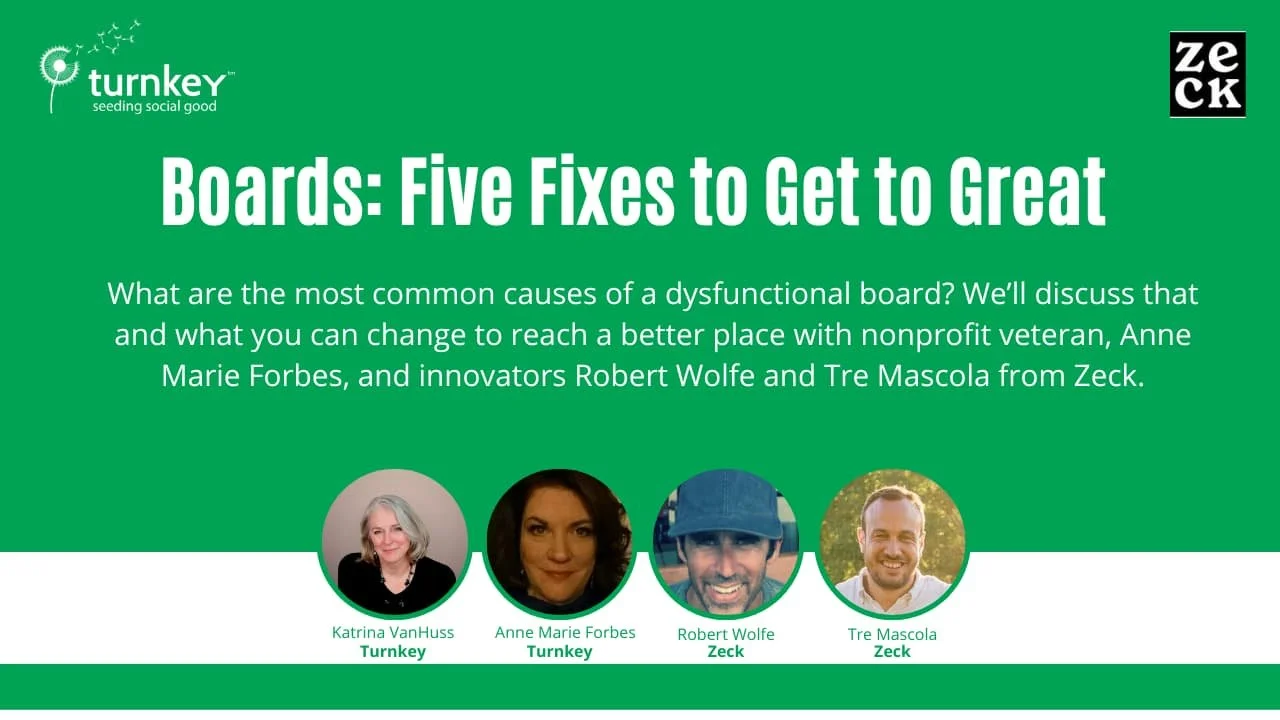Repositioning the Revenue Department for the Content Creator Wave
The boundaries between livestream fundraising and traditional peer-to-peer fundraising are disappearing. Our donors and fundraisers are iterating faster than we are, erasing the difference between these two departments as influencers become content creators who are team captains. This "horseshoe dynamic" requires a restructuring of the revenue department. Not doing so means losing constituents and income.
Time for Training: Building a Strong Nonprofit from the Inside
In this NXUnite webinar, panelists dove into proven strategies for fostering internal training and development. These experts shared insights and practical tips on how to create a culture of continuous learning, improvement, and team empowerment. Building a strong, skilled, and motivated team is key to driving long-term success, especially in the nonprofit sector.
What to Do About Facebook’s Fundraising Changes
Facebook ceased processing donations in Ireland in 2023. Adrian O’Flynn, Founder of GYSS in Ireland, had to contend with this situation that we in the US now fear. How his firm and its social good clients managed this turn, and when, will surprise and delight you. Turnkey For Good Founder, Katrina VanHuss, and O’Flynn take an in-depth look at Facebook’s twists and turns and how someone in your shoes can manage them successfully.
Your Livestream Fundraiser Just Became a Creator (Part 2)
In the second class of this 2-webinar series, Michael Wasserman explains why addressing the tools of social influencers in the specific and incorrect terms of “livestream/gaming” is limiting to results. Katrina suggests quitting your job and jumping to the next one because your organization may never get over seeing you as that “gaming fundraiser.” Dr. Otis Fulton explains how content creators can help you build your nonprofit community.
Your Livestream Fundraiser Just Became a Creator (Part 1)
We will help you understand the way the market is shifting from livestreaming to content creation and how it could impact your revenue program. Along the way we'll dive into the psychology of community, a huge driver of content creator success including livestreaming and short/longform content.
AI For Good - But Is It?
AI is all over the news lately, causing CEOs and organizations to assume they know everything they need to know about AI. Assumption is dangerous. Our guests will help us explore how we can identify and address the risks, while still enjoying the benefits of AI.
Boards: Five Fixes to Get to Great
A veteran of board management and strategy, Anne Marie Forbes helps to identify, name, and address the most prevalent foibles of dysfunctional boards. We help you see the ways to reach a better place, and even show you some tools that can assist. Whether you are a board member, an Executive Director or CEO, or a staff person responsible for preparing for board meetings, this will be helpful.
The Argument for Events: Steve Merker of Princess Margaret Cancer Foundation Connects Events to Overall Organizational Success
While consultants have often recommended cutting events based on ROI calculated on single year revenue, Steve demonstrates event impact on lifetime value of constituents who populate other revenue channels. Gone are the days when events are measured by money only. Instead, events should be primarily measured by: acquisition, retention & engagement (lifetime value), and secondarily in annual revenue.
How To Be Fully Heard and Avoid Listener Defensiveness
You’ve been in those conversations with someone at work who just rubs you the wrong way. No matter what they say, it’s hard for you to agree with them. It’s hard to work with them.
Or maybe you’ve been the one that someone just won’t listen to. You tell them an answer, but it feels like they don’t want to hear it. Work stalls.
This webinar will explain the psychology behind the bad feelings that get in the way of work and teach you how to avoid having exchanges of information happen that way.
The Decline of the Small Donor: Why & What To Do About It
Post Covid, human behavior has changed significantly when it comes to philanthropy and support for nonprofits.
In-person events continue to struggle, it is harder and harder for nonprofits to find new donors, and overall, individual giving has declined for several years in a row.
This panel will dive into how the fundraising landscape has shifted and more importantly, how nonprofits are responding, and what might be better ways to respond? What will it really take to stop the downward trends? Let’s talk about it with big thinkers.
Navigating Difficult Conversations
During important conversations, your bodily responses get involved. Facts fade away and the goal changes from moving the mission forward to “winning” the conversation.
But we have choices. In these moments, we can be disciplined and use methods proven to advance the mission and protect relationships, or we can crash and burn but “win” our short-term point.
Mac Smith, Director of Sales & Marketing at 501(c) Services, brings to the table Turnkey’s VP of Psychological Strategy, Otis Fulton, PhD, and Turnkey COO Stacey Murrell as they tease apart how to navigate difficult conversations with better outcomes.
The Path to Revenue Runs Through Community
The Pediatric Brain Tumor Foundation (PBTF) uncovered a crazy truth: if we don’t focus on revenue, the revenue shows up. If we focus on providing constituents with connection and service INSIDE our revenue products, revenue shows up. If we focus on the top of the funnel, the bottom of the funnel takes care of itself. Hear how PBTF transformed a Facebook Challenge Group into a community hub.
Building Digital Infrastructure - From the Non-IT Boss’ Perspective
At the 2023 Good Tech Fest, Katrina VanHuss led a panel discussion exploring how the non-IT Big Boss manages digital infrastructure via collaboration with tech professionals.
Host: Katrina VanHuss, Turnkey Founder and CEO, leads the discussion with panelists:
Laura Thrall, Independent Nonprofit Board Director
Jason Menzo, CEO, Foundation Fighting Blindness
DJ Hampton, CEO, Trident United Way
The Psychology of Auction Fundraising
Watch and listen in “The Psychology of Auction Fundraising” as host Katrina VanHuss, Turnkey CEO, leads a panel discussion of experts with Event.Gives exploring the unconscious drivers at work during auctions. Called “auction fever,” people wind up paying much more than they should for items.
How the ALS Association is getting sand out of its strategic plan’s gears
The ALS Association has ambitious plans to improve the lives of people with ALS. Leadership had to make sure everyone in the organization was pulling on the same rope, in the same direction. Learn how in this webinar.
Using Identity and Community-Building to Drive Facebook Fundraising
Appealing to supporters’ identity and building community are key to ramping up revenue with Facebook Fundraising. Join GoodUnited’s Maria Clark and Turnkey’s Otis Fulton to dig into the psychology behind driving Facebook Fundraising.
When Event Staff Don’t Want to “People” Anymore
Is your staff shying away from face-to-face work with others they did pre-COVID? Turns out, that’s happening at a lot of organizations.
Overcoming “In the Room” Reluctance With Technology-Driven Risk-Reduction Protocols and Broad Thinking
How do you get 600 people registered for an auction, bidding, and paid-up fast while allowing them to maintain their comfortable distance at your in-person event as much as humanly possible? How do you flip to virtual without additional expense if the covid environment demands it?
A Strategy Story: In 3 Parts - None of Which Involve a Dusty Shelf
Humans tend to focus on the short term. Strategic planning is often something “we don’t have time for here.” If that’s you, then now’s the time to change!



















